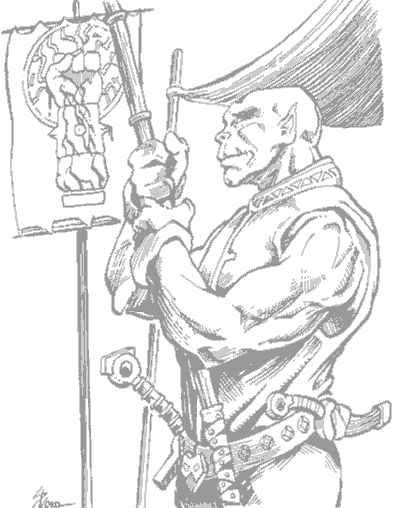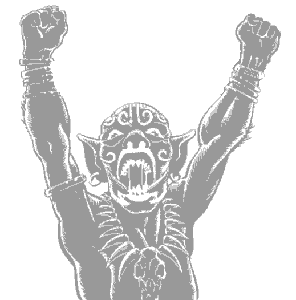How It Works
As has been said, Shagrat's Lair is an online role playing game based on the Rolemaster™ system made by Iron Crown Enterprises, Inc. This system was chosen because, in our opinion, this system offers the most detail, the most flexibility, and is easily added to and modified. Please note that, although Shagrat's Lair has great love for ICE, we are not affiliated with them in any way.
Character Creation
In Shagrat's Lair, all the players are some type of Orc. This is an interesting switch as most experienced role players are used to hacking down Orcs like mowers cut grass. This sort of entering into the "other side" is both challenging and fun as you carve out exactly what sort of Orc you want to be and struggle to triumph in a world inhabited with monsters, competing Orc clans, and your sworn enemies -- the Elves.
 Play begins by sending me an email telling me that you're ready and willing. In this email, you may specify your name, gender, and race. I put "may" in italics because you do not have to specify any of that. Depending on how realistic and/or challenging you want your game to be, you can opt for no control over those factors -- just like real life. However, you will not be penalized in any way for deciding those things in advance. It is not necessary to provide any information about statistics or a profession.
Play begins by sending me an email telling me that you're ready and willing. In this email, you may specify your name, gender, and race. I put "may" in italics because you do not have to specify any of that. Depending on how realistic and/or challenging you want your game to be, you can opt for no control over those factors -- just like real life. However, you will not be penalized in any way for deciding those things in advance. It is not necessary to provide any information about statistics or a profession.
After receiving your email, you will be given a description of your character at early childhood. The description will contain few numbers. You will only know about yourself what your character knows about him/herself, i.e. that you are generally stronger than others, or that you are preternaturally quick, or that you have trouble keeping your temper. Like the real world, you will have to make the most of what you've got by exploiting and developing your strengths and overcoming or compensating for your weaknesses. If you're as dumb as a post, but you want to be the world's first Orc botany textbook writer, more power to you. During childhood, you will learn the things that little Orcs learn and pick the things that interest you most. Your childhood may or may not be eventful, which could affect your character in more ways than one.
Eventually, you will move on to the Orcish equivalent of an apprenticeship. The choices open to you will depend on your race, your childhood experiences and interests, and personal desire. There are no real a priori prohibitions on your profession, although some professions are so rare in Orcdom as to be unheard of. Still, if you are willing to surmount difficulties, you can pretty much be anything you want, although some paths will certainly be easier than others.
After your apprenticeship, you will then probably hold down a job of some sort. It is at this stage of the game (although you might go through a couple of jobs, first) that you will join the "party at large." Don't worry about how; that's our job.
One word of warning: players may be tempted to focus on developing only skills and knowledge that they believe will come in handy. Many role players will spend their time beefing up their combat skills, magical skills, thieving skills, perhaps some first aid, and very little else. This practice of narrow development is discouraged in Shagrat's Lair for three main reasons. 1) Realism. Very few people focus on, say, combat training exclusively for their entire lives. Most people develop more than one hobby or interest outside of their "job," and most people acquire more than their fair share of trivial or seemingly unimportant knowledge. In the name of realism, players should not balk at spending a little time developing areas which may not seem like they would come up very often. 2) Dependence. Players who do not possess a skill are at the mercy of others who do. When the right situation comes up, people with an obscure skill can easily take advantage of everyone else. This is especially noteworthy when it comes to reading or basic math (how many gold pieces is your share, again?). 3) The Malice of the GM. Do not underestimate the Game Master's desire to frustrate you. If nobody in the party knows how to play a musical instrument, you can bet that some ancient trap will only be disarmed by music. If nobody knows how to cook, the group could be in for some hard times when forced to eat animals of dubious origins. If nobody knows how to use maps, heh heh. Any skill you can think of has its applications and is not a waste of your time, so don't be afraid to branch out a little. Be creative, and you will be rewarded.
Game Play
Before you join the party, your play will happen through email with the Game Master. After you join the party, you will begin posting to the public forum where you can interact with the group. Every so often, a new "turn" will be posted by the Game Master describing current events. You then decide your actions and post them publicly. Of course, if you want to do something you don't want anyone else to know about, you can email your actions to the Game Master. Likewise, if you want to have a private conversation with another player in secret, email what you want to say to the Game Master. This may seem like a foolish request, but it serves the dual purpose of retaining the privacy of the players' email information as well as allowing for a more realistic working into the game. If you're travelling around with a group of people and you don't want anyone else to know about your conversation, you're going to need to do some real planning. Some situations, such as combat, would not allow for any private conversation at all.
Although actions will be resolved using dice, percentages, and modifiers, your character will not know any of that. The Game Master will not tell you the percentage of likelihood of success. You will have to weigh the risks of each action yourself, just like real life. If you've never seen a horse before, your chances of successfully riding one are poor. If your character has some experience riding horses, you can probably trot around with confidence, but you'll want to weigh the risk before making it jump over a line of pikemen. The Game Master's job is to supply you with all the information your character would know. Sometimes you will be confident in your abilities, sometimes you will be unsure of yourself, and sometimes you won't have any idea about whether you should do something or not, but you just have to buck up and do it. The idea here is to restore passion and life to role playing instead of the elaborate math contest it often ends up being.
Combat
Most Orcs know how to defend themselves one way or another, and the opportunity to do so will come up often.
 Combat turns will take place much like any other turns with a somewhat faster post rate (hey, it's combat -- you don't have time to sit around). In many scenarios, a layout will be posted showing the area and the location of the combatants, especially if there's a lot of people involved. Even in this area, though, primacy is given to description.
Combat turns will take place much like any other turns with a somewhat faster post rate (hey, it's combat -- you don't have time to sit around). In many scenarios, a layout will be posted showing the area and the location of the combatants, especially if there's a lot of people involved. Even in this area, though, primacy is given to description.
Other than such things as are visible in combat, no numbers will be given out. Nobody will hit you for ten points of damage, but somebody might cut a deep gash on your left arm that is now bleeding heavily. This approach may make some players nervous; how is one to know if one is close to death without numbers? There are two key things that take care of this problem. One is to keep track of your character's condition. Your character is not a bundle of hit points. He or she is a biological (albeit an imaginary) entity. If you're bleeding from every appendage on your body, maybe you'd better take care of that before jumping back into the fight. If you've just taken a deep cut to your chest or stomach, something important has probably been damaged. If you've been fighting for two hours straight, maybe you should sit down before going into the next room. The second thing is that the Game Master does not want you to die unnecessarily and will drop strong hints like, "You feel as though even a mild hit would make you lose consciousness," or, "You barely have enough strength to lift your club," or, "You see a bright light and hear voices of dead friends and family." You know, hints.
In the same way, numbers will not be used to describe your chances to hit. If you've trained with a sword, you'll probably hit stuff with it. Numbers will also not be used to describe how powerful weapons are. Any weapon can deliver a killing blow if the opportunity and strike are right. As for bonuses to hit, you will not find a +10 sword, you will find a sword that is made of exceptional metal and quality, or a sword that seems to radiate a special aura. If you want to know enough to distinguish between higher-quality weapons, invest some time in learning about metals or swords.
Character Development
As the game progresses, your character will develop both in attributes and skill. Not just killing monsters, but doing damage to monsters, successfully using skills, travelling, taking a beating, and coming up with bright ideas will all develop your character in different ways.
The key thing to remember is that the things you do throughout the course of the game will dictate how you develop. If you spend a lot of time in the woods, you will learn more and more about surviving in the woods. If you mostly use a sword for combat, your skill with the sword will develop. Conversely, you will not develop skills that you do not use nor will you acquire knowledge that is unavailable to you. If there are things you'd like to learn or skills you would like to develop that do not seem to be coming up naturally in the game, you will need to seek out a teacher or library or you will just need to practice on your own when you have time.